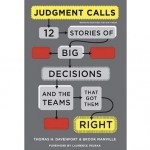I understand the desire to study great leaders. It is my own habit as well. I gobble up biographies of Abraham Lincoln, Franklin Roosevelt, Martin Luther King, Jr., Winston Churchill, Mahatma Gandhi, Nelson Mandela, and currently Steve Jobs. But I read because I am interested in history. I do not believe that studying these leaders will reveal the secret formula to great leadership. Ultimately they were human beings with great strengths and also human flaws, and I think it is a huge mistake to idealize them and try to copy them.
 The traditional paradigm where the great leader imparts his wisdom and leads his organization to great heights does not work in today’s world.
The traditional paradigm where the great leader imparts his wisdom and leads his organization to great heights does not work in today’s world.
With an expanding global economy, a digital information explosion, and increasingly rapid pace of business, our world is too large, our organizations too complex. One person, no matter how great, can’t know everything. The days of “Father Knows Best” are over.
 Instead of focusing solely on where they are taking their organization, leaders are better served to first think about what kind of organization they are building.
Instead of focusing solely on where they are taking their organization, leaders are better served to first think about what kind of organization they are building.
This is not a new discussion. Since the 1990’s when Peter Senge popularized the notion of “learning organizations,” there has been a lot of discussion about attributes of great companies. Books like Built to Last (Collins and Porras, 1997) and Good to Great (Collins, 2001) have laid a foundation. But because not much has been written about what it looks like in daily practice, many people continue to wonder whether it is realistic.
We need more models of what these organizations look like in real life.
 For this reason I was delighted to discover Judgment Calls: 12 Stories of Big Decisions and the Teams That Got Them Right by Thomas Davenport and Brook Manville (Harvard Business Review Press, 2012)
For this reason I was delighted to discover Judgment Calls: 12 Stories of Big Decisions and the Teams That Got Them Right by Thomas Davenport and Brook Manville (Harvard Business Review Press, 2012)
Davenport and Manville provide 12 case studies of critical decisions made in real organizations – where courageous leaders let go of the notion that leadership is about knowing where you’re going and who tapped into the collective wisdom of their organization to make the right decision.
Judgment Calls shows what it looks like in organizations that have developed the ability to make better decisions through a broad-based, data-intensive approach. These are real stories and there is much to learn from them.
Leadership is about building organizational capabilities and harnessing the collective wisdom of the organization. Davenport and Manville’s case studies are organized around four themes:
- Utilizing collaborative processes for decision-making
- Accessing the plethora of available data and transforming it into useful information
- Being guided by a powerful organizational culture that values participation, diversity, challenge and debate
- Leaders who their role is to develop the context and structures that support collective exploration and problem-solving
As real-life is somewhat messy, so are the examples described in Judgment Calls. There is no “cookbook” here, but the lessons are clear.
Warren Bennis once said, “Leaders are people who do the right thing.” I would amend it to say, “Leaders are people who create organizations that do the right thing.” Real examples like those provided in Judgment Calls provide us with a believable picture of what it looks like when organizations “do the right thing.”













I’ve been blogging about the fact I don’t like to read. For me, most books don’t keep my attention. Not sure if it’s me or the material.
When I do find a memoir or biography that keeps my attention, I hope to receive one or two nuggets that adds to my development.
I like the notion from the authors of Judgement Calls that leaders don’t know everything. In fact, they make it up as they go along. Looking outward for innovative ways to improve.
With everything I’ve read on the subject, leadership is about being a great person.
You are not alone in your experience of books not keeping your attention. You might like Judgment Calls because it’s really 12 short vignettes, each with some nuggets. As always, I appreciate your comments, Steve.
Another great post, Jesse.
I agree that learning about leaders from a historical perspective does not necessarily help us become great leaders today. There are many amazing and inspirational stories to draw from, however, we cannot exactly replicate those circumstances no matter how similar a situation may be. Why? I believe it has to do with the fact that every human being is different. Comes from a different background. The past also had dynamics, social structures, cultures, and traditions that are not the same as the here and now.
One of the hurdles we need to overcome as a society has to do with our dependency on ‘cookie cutter’ approaches to every day problems. If that makes sense. We’ve been taught to follow ‘formulas’ and in doing so, we tend to leave out thinking for ourselves, and following the guidance we have within. Some of the more intuitive skills and powers that we have to deal with situations as they arise. This is what we really need more practice with as leaders in every arena, be it on the job or at home.
I’m also commenting today because yesterday I shared a link to a post on Social Fairness by Dr. Ellen Weber. She was sharing what looks to have similar insights in collaborative efforts by tapping into the wealth and experience of knowledge/talents of many in order to solve problems.
Tapping into the collective wealth of an entire group is really a great way to leverage a team for finding solutions and gaining new ground.
Thanks again for sharing, Jesse.
Hi Samantha,
Well said! “Tapping into the collective wealth of an entire group is really a great way to leverage a team for finding solutions and gaining new ground.” I appreciate your thoughts on why it’s not possible to replicate great leaders – it seems like a confluence of the right person at the right place at the right time. But we can replicate developing collaborative processes that tap into the wisdom of teams and organisations Thanks for the reference to Ellen Weber’s post. This is such an important topic. I appreciate your adding to the conversation.
Jesse, I will certainly add the book to the list. I am not big on biographies, but do like them for making you connect with other things at play in how a person is wired, successful or not. While sometimes it can feel like I learnt nothing new from a leadership perspective in some of the books I read, I appreciate the “reminder of lesson learnt” bit to reinforce the message. What makes Judgment Calls attractive for me is the case study approach as I like the mix of theory relative to real data and dynamics.
That’s what I liked about it, too, Thabo. I appreciate theory, but without clear practical application it doesn’t do us much good. Nice to see you here, Thabo.
Jesse,
Thanks again for your insight. I agree that the definition of a learning organization is not clear. Due to this, when the phrase is used it almost seems like rhetoric even if the leaders involved have positive intent. I am going to take a look at this recommended book to see if there are behaviors that we might start to use to describe what it means to be a learning organization. In reference to Samantha’s post above, I couldn’t agree more that we underestimate the values of intuitive skills as a key to an effective leader. I’d love to see some literature written on this topic.
Hi Beth, The interesting thing about this book is it never uses the label “learning organization” – it really is a collection of case studies of how critical decisions were made without relying on one great leader. It is my own observation that these are “learning organizations.” I think we get into trouble when we rely on labels because we start categorizing behaviors and assuming people understand what they mean instead of describing what is actually occurring. That’s what I liked about this book – it’s descriptive of what some collaborative processes look like in practical action. Regarding intuition, that’s an interesting topic. I agree that some ways we undervalue it, but I also think in other ways we over-value when it comes to how we view great leaders. We assume they intuitively understand something the rest of us don’t I also think there’s more to be studied and learned about how to access, use and integrate relevant data with intuitive decision-making. Thanks so much for adding your thoughts to the conversation.